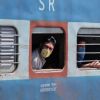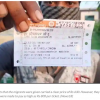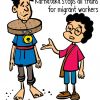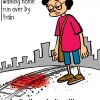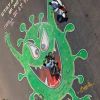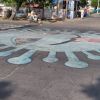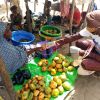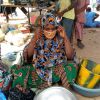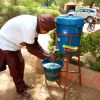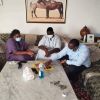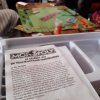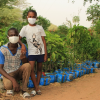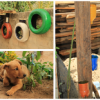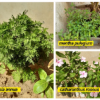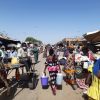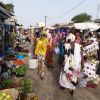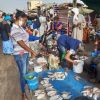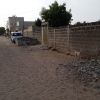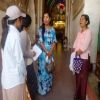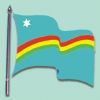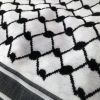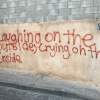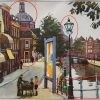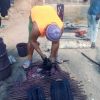Accession cards
The search found 108 results in 0.031 seconds.
Search results
Taking the Migrants Home (1)
Indian Railways announced operation of more Shramik special trains for evacuating stranded migrant workers, labourers, pilgrims, and students from various parts of the country from May 4. The decision came after the Union Ministry of Home Affairs issued guidelines for the movement of these groups of people on May 1, 2020... a decision that gave some glimmer of hope to the thousands of stranded migrant labourers across the country after the lockdown was announced on 23 March 2020.
Taking the Migrants Home (2)
Shramik Special trains were started to take home lakhs of stranded migrant labourers and their families to their hometown. Many of them have run of out of money and food because of the restrictions imposed to combat the Covid 19. The relief mesaures have been ill planned. Those coming from Surat in Gujarat have alleged that they were charged Rs 800 against a ticket with a printed cost of Rs 630. The labourers said they had no choice but to pay the money if they wanted to return.
Taking the Migrants Home (3)
“These are people who have come to work in Bangalore. Once there is employment, normalcy will get established… so why go back then? Those who still want to go back can do so using their own vehicle,” said N Manjunath Prasad, nodal officer for inter-state travel from Karnataka.
The CM of Karanataka BS Yediyurappa met prominent builders and real estate firms who reportedly expressed concern over the mass exodus of labourers on 5 May.
Taking the Migrants Home (4)
Many migrant labourers and their families have started walking to reach their home towns after the uncertainities of train arrangements and costs. Among them was a group of 20 migrants who undertook the long walk home from Jalna (Maharashtra) to Bhusaval, 157 km apart. The group chose to walk on railway tracks in order to avoid the highway, where they could have been stopped. The group likely assumed that the trains were not running.
Warding off the virus with Corona Drishti in Chennai, Tamil Nadu
Floor drawings, especially those made by variously connecting a grid of dots using white rice flour powder or paste, are often seen at the entrance of people's homes in Tamil Nadu. Known as the kolam, these designs are typically executed by women as part of early morning household chores and renewed daily as a recurring motif of everyday life. This kolam depicts the coronavirus as the evil eye that will protect, but equally harm, if not heeded.
Covid-19: Reflections from Gao, Mali (2)
La région de Gao au Mali a pris très au sérieux la pandémie covid 19. Toutes les structures sont en campagne de sensibilisation à travers des sketches et des kakemojo. Mais aussi a travers des distributions de gel hydro alcoolique, savon pour se laver les mains et des masques pour se protéger dans des endroits publics. Les structures sont équipées de kit. Le taux de contagion est faible mais des cas sont enregistré. Tout le monde est entrain de fournir l'effort de mettre fin à cette pandémie.
Suivrons des images en cuise d'illustration.
Staying at Home Around a Board Game (1)
Today, we have been self- confined for over a month. When I wake up, as I do every morning, I take a little walk on Twitter. Today I came across this tweet from the official account of the First Lady of Senegal, Marième Faye Sall. You can see on the post the sentence « Togg Leen Seen Keur » (stay home in wolof) followed by the hashtag #FaaxasCovid19 (#getoffcovid19). There are also three photos of the first lady, the president and one of their sons, dressed in casual clothes, playing Ludo, a popular board game in Senegal. The comments under this tweet are very diverse.
Staying at Home Around a Board Game (2)
Around the meal, I discussed this post (https://bit.ly/3eYutcd) with my family members, our perceptions and interpretations were just as diverse as what I had read in the comments. We did agree on one thing, however: to add "board games" to the list of activities we had drawn up to facilitate confinement. Finally, and after this interesting discussion around the bowl, we chose another game - monopoly, because the Ludo is limited to 4 players. From that day on, the confinement time seemed less long and less boring to us.
Making Life Sustainable During Covid-19 (1)
After more than two months of self-confinement, we went out on 10 May 2020 with the younger ones to buy plants. We went out with a purpose. We decided to set up a small garden in the courtyard of our house. The next few days were very exciting as we collected and transformed many objects that were lying around the house and used them to decorate our plants (tires, empty bottles, etc).
A Visit to the Market Place (1)
This morning I was at the marketplace, after more than a week without going out. I was astonished by what I saw: almost everyone (adult, child, woman, man, young, old, buyer, seller, security guard...) had a mask. I was astonished because in social networks (Twitter, Facebook) I keep hearing about "the indiscipline of Senegalese who do not respect the barrier measures, especially the wearing of masks". I personally found it very responsible that everyone has a mask, with a few rare exceptions. Then I am aware that there are all the problems related to the quality of the mask and its use.
A Visit to the Market Place (2)
Maybe the people I met today are not asking themselves all these questions. The awareness messages just ask them to "wear" a mask. At the same time, the Minister of the Interior has issued an order on the wearing of masks and the police are punishing all those who do not respect the measure by making them pay a fine of between 3000 and 6000 CFA. One of my neighbors who goes to the market every day told me that she thinks it's a bit stupid to have to pay such sums when a mask costs between 100 and 300 CFA on each street corner.
Chatting in the Street Under My Window (1)
It is on this street, which is on the right side of my house, that the window of my room opens. Every morning when I wake up, I look through it mechanically, even if I can't see anything out of the ordinary. It's a quiet street and not very busy, especially in the morning. The house with the mustard-yellow door is one of the oldest in the neighborhood: it was built in the 1970s by a shopkeeper from Gandiol in northern Senegal. The bricks with decorative motifs that were used to build the wall are typical of this period and are now only seen on very old buildings.
Belief and Practices: Place-based Study at Kyauktawgyi Pagoda
Kyauktawgyi Pagoda is located in Taungthaman Village tract: which includes Semi Tun Village, Taungthaman Village, Oh Bo Village, Htantaw Village. Kyauktawgyi Pagoda is surrounded by these villages, and children from nearby villages come and play at the pagoda.
A Flag, a Story and a Nation
One of the first women to ever weave the Naga national flag, Lathon Kemp, passed away on the 5th of January, 2021. The news of her death brings to mind the flag and the very important place it holds in the life of the Nagas. Although, it was hoisted for the first time on the 22nd of March in 1956 in the Parashen-Rengma region, the Nagas believe the flag to have a divine origin and not designed by any mortal. A red, green and yellow rainbow is spread out against a field of blue which represents the sky.
Share & Tell: seeking through the culture / the place
[ _ a note ]
This time, the trip to the Netherlands reminds me of my life in Palestine.
Looking back at Leiden: Where was this painting made?
Having visited an antique convention in the Hague a few months ago, I found this postcard being sold that was labeled as being from Leiden. Supposedly a postcard of the city painted in 1934 by artist Bernard van Vlijmen (1895-1972) as indicated on the bottom left corner initials of B.V.Vlijmen, the watercolor art is drawn from the perspective of someone overlooking the cityscape, half of the painting being the city streets and its buildings with people walking by, and the other half being a canal, with everything being interconnected by bridges and walkways.
Indigo Textile Dyeing in Daboya, Ghana
The Indigo Dyeing Tradition in Daboya: Notes from the Field
Daboya is a semi-urban community in the Savanna Region of Ghana. It is well noted for its organic indigo textile dyeing and weaving tradition which dates back to over three centuries. Before the introduction of synthetic dyes, Indigo was the foundation of most textile traditions in West Africa. In Ghana, most of the traditional smock dresses and related fabrics that are worn are produced in Daboya. Below, I present an account of the indigo dyeing process as observed in Daboya in May 2022.
Unsettling Facts You Need to Know about Matrimonial Sites
Femmes for Freedom (FFF) is a feminist organization founded by Shirin Musa in the Hague, Netherlands, in 2011. It aims to defend girls’ and women’s rights and advocate against gender-based violence, particularly, marital captivity (Femmes For Freedom, 2022). FFF noticed that several women victims that reached out to them for help had met their husbands through matrimonial sites, which is a variation of standard dating websites. However, the main focus is on those wanting marriage, instead of simply dating (Soneji, 2022).
An “Insular” Introspective On Memory & Cross-Cultural Exchanges
The photograph seen here is of the Insular Ice and Cold Storage Plant during its final stages of completion located in Ermita, Manila, Philippines. Inspired by one of Mesha Murali and Surajit Sarkar's accession cards for the Centre for Community Knowledge (CCK)'s Delhi Memory Archive (see related links for the original accession card), I felt inspired to look towards some old photgraphs of Manila from the American colonial period to find some of, what they refered to as "the relational and intangible aspects of the everyday urban experience". This is one such photograph.
Pages
Site of knowledge & meaning
Concerns
- Place-making (26) Apply Place-making filter
- Pandemic (22) Apply Pandemic filter
- Public Space (18) Apply Public Space filter
- Community (17) Apply Community filter
- History (13) Apply History filter
- Identity (13) Apply Identity filter
- Group Identity (12) Apply Group Identity filter
- Urban Space (12) Apply Urban Space filter
- Religion (10) Apply Religion filter
- Migration (9) Apply Migration filter
- Women (9) Apply Women filter
- Heritage (8) Apply Heritage filter
- Transport & Infrastructure (8) Apply Transport & Infrastructure filter
- Gender (7) Apply Gender filter
- Neighbourhood (7) Apply Neighbourhood filter
- Waste (7) Apply Waste filter
- Agriculture (6) Apply Agriculture filter
- Belief (6) Apply Belief filter
- Children & Youth (6) Apply Children & Youth filter
- Economy (6) Apply Economy filter
- Health (6) Apply Health filter
- Nation & Nationalism (6) Apply Nation & Nationalism filter
- Borders (5) Apply Borders filter
- Space (5) Apply Space filter
- Trade (5) Apply Trade filter
- Art & Architecture (4) Apply Art & Architecture filter
- Family (4) Apply Family filter
- Hygiene (4) Apply Hygiene filter
- Livelihood (4) Apply Livelihood filter
- Myth & Legend (4) Apply Myth & Legend filter
- Spirits (4) Apply Spirits filter
- Communication (3) Apply Communication filter
- Elders & Elderly (3) Apply Elders & Elderly filter
- Food Cultivation (3) Apply Food Cultivation filter
- Animals & Livestock (2) Apply Animals & Livestock filter
- Civil society (2) Apply Civil society filter
- Colonialism (2) Apply Colonialism filter
- Craft (2) Apply Craft filter
- decolonization (2) Apply decolonization filter
- Education (2) Apply Education filter
- Indigenous Agency (2) Apply Indigenous Agency filter
- Superstition (2) Apply Superstition filter
- Activism (1) Apply Activism filter
- appropriation (1) Apply appropriation filter
- Cityscape Art (1) Apply Cityscape Art filter
- Commercialisation (1) Apply Commercialisation filter
- Culture (1) Apply Culture filter
- Democracy (1) Apply Democracy filter
- early modern trade networks (1) Apply early modern trade networks filter
- Environment (1) Apply Environment filter
- Ethnic Identity (1) Apply Ethnic Identity filter
- Feminism (1) Apply Feminism filter
- Festivals (1) Apply Festivals filter
- Food Consumption (1) Apply Food Consumption filter
- Food (In)Security (1) Apply Food (In)Security filter
- frame (1) Apply frame filter
- Identity Politics (1) Apply Identity Politics filter
- Indigo (1) Apply Indigo filter
- Language (1) Apply Language filter
- Lifestyle (1) Apply Lifestyle filter
- Marriage (1) Apply Marriage filter
- Music (1) Apply Music filter
- Placemaking (1) Apply Placemaking filter
- Politics & Bureaucracy (1) Apply Politics & Bureaucracy filter
- Rice (1) Apply Rice filter
- Rights & Law (1) Apply Rights & Law filter
- Ritual (1) Apply Ritual filter
- Self-determination (1) Apply Self-determination filter
- Sexism (1) Apply Sexism filter
- Social Media (1) Apply Social Media filter
- Status (1) Apply Status filter
- Sustainability (1) Apply Sustainability filter
- textile histories (1) Apply textile histories filter
- Tradition (1) Apply Tradition filter
- Transnational histories (1) Apply Transnational histories filter
Feeling & motive
- Awareness (13) Apply Awareness filter
- Memory (12) Apply Memory filter
- Solidarity (12) Apply Solidarity filter
- Exchange (10) Apply Exchange filter
- Adaptation (9) Apply Adaptation filter
- Empowerment (6) Apply Empowerment filter
- Pride (6) Apply Pride filter
- Resistance (6) Apply Resistance filter
- Concern (5) Apply Concern filter
- Learning (5) Apply Learning filter
- Agency (4) Apply Agency filter
- Celebration (4) Apply Celebration filter
- Change (4) Apply Change filter
- Desperation (4) Apply Desperation filter
- Nostalgia (4) Apply Nostalgia filter
- Relaxation (4) Apply Relaxation filter
- Survival (4) Apply Survival filter
- Belonging (3) Apply Belonging filter
- Transformation (3) Apply Transformation filter
- Charity (2) Apply Charity filter
- Disappearance (2) Apply Disappearance filter
- Freedom (2) Apply Freedom filter
- Hope (2) Apply Hope filter
- Hunger (2) Apply Hunger filter
- Independence (2) Apply Independence filter
- Passing Down (2) Apply Passing Down filter
- Recognition (2) Apply Recognition filter
- Sharing (2) Apply Sharing filter
- Abandonment (1) Apply Abandonment filter
- Access (1) Apply Access filter
- Autonomy (1) Apply Autonomy filter
- conflicted (1) Apply conflicted filter
- curiosity (1) Apply curiosity filter
- Difference (1) Apply Difference filter
- Exclusion (1) Apply Exclusion filter
- expression of gratitude (1) Apply expression of gratitude filter
- Livelihood (1) Apply Livelihood filter
- Love (1) Apply Love filter
- Neglect (1) Apply Neglect filter
- Ownership (1) Apply Ownership filter
- place (1) Apply place filter
- Prejudice (1) Apply Prejudice filter
- Preservation (1) Apply Preservation filter
- Protection (1) Apply Protection filter
- Reciprocity (1) Apply Reciprocity filter
- Reflection (1) Apply Reflection filter
- Sadness (1) Apply Sadness filter
- Segregration (1) Apply Segregration filter
- Tradition (1) Apply Tradition filter
- Unequal (1) Apply Unequal filter
Image contains
- Photograph(s) (68) Apply Photograph(s) filter
- Archival Photograph(s) (5) Apply Archival Photograph(s) filter
- Cartoon (2) Apply Cartoon filter
- Illustration or Chart (2) Apply Illustration or Chart filter
- Photograph (2) Apply Photograph filter
- photographs (2) Apply photographs filter
- architecture (1) Apply architecture filter
- Ballangbang cultural dance (Igorot) (1) Apply Ballangbang cultural dance (Igorot) filter
- Cakewalk (American Dance) (1) Apply Cakewalk (American Dance) filter
- Drawing (1) Apply Drawing filter
- edifice (1) Apply edifice filter
- Museum (1) Apply Museum filter
- Negrito (Philippines) (1) Apply Negrito (Philippines) filter
- Poster (1) Apply Poster filter
- Screenshot (1) Apply Screenshot filter
- Textile Art (1) Apply Textile Art filter
- Various Matrimonial Sites (1) Apply Various Matrimonial Sites filter
- Watercolor Painting (1) Apply Watercolor Painting filter


